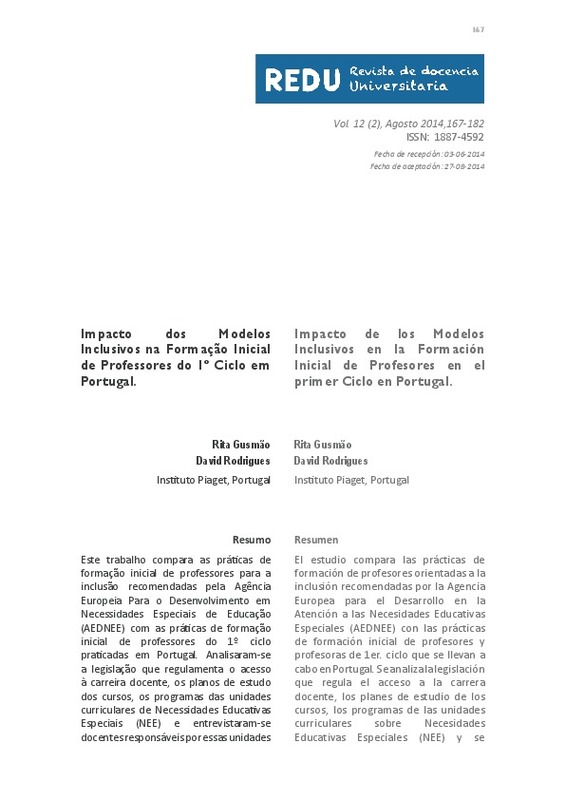Agência Europeia para o Desenvolvimento da Educação Especial (2012). Perfil de Professores Inclusivos.Odense: Agência Europeia para o Desenvolvimento da Educação Especial.
Anh, D. (2013). Identity in activity: examining teacher professional identity formation in the paired-placement of student teachers. In Teaching and teacher education, 30, 47-59.
Bain, A.; Lancaster, J.; Zundans, L. & Parkes, R. (2009). Embedding evidence-based practice in pre-service teacher preparation. In Teacher education and special education, 32(3), 215-225.
[+]
Agência Europeia para o Desenvolvimento da Educação Especial (2012). Perfil de Professores Inclusivos.Odense: Agência Europeia para o Desenvolvimento da Educação Especial.
Anh, D. (2013). Identity in activity: examining teacher professional identity formation in the paired-placement of student teachers. In Teaching and teacher education, 30, 47-59.
Bain, A.; Lancaster, J.; Zundans, L. & Parkes, R. (2009). Embedding evidence-based practice in pre-service teacher preparation. In Teacher education and special education, 32(3), 215-225.
Bondy, E.; Ross, D.; Adams, A.; Nowak, R.; Brownell, M.; Hoppey, D.; Kuhel, K.; McCallum, C. & Stafford, L. (2007). Personal epistemologies and learning to teach. In Teacher education and special education, 30(2), 67-82.
Cook, L. (2007). When in Rome...Influences on special education student-teachers' teaching. In International Journal of Special Education, 22(3), 119-130.
Darling-Hammond, L. (2006). Constructing 21st-century teacher education. In Journal of teacher education, 57(3), 300-314.
European Agency for Development in Special Education Needs (2009). Key principles for promoting quality in inclusive education: recommendations matrix. Odense: European Agency for Development in Special Needs Education
European Agency for Development in Special Needs Education (2010). Teacher Education for Inclusion - International LiteratureReview. Odense: European Agency for Development in Special Needs Education.
European Agency for Development in Special Needs Education (2011). Key Principles for Promoting Quality in Inclusive Education - Recommendations for Practice, Odense: European Agency for Development in Special Needs Education.
Florian, L. & Rouse, M. (2009). The inclusive practice project in Scotland: teacher education for inclusive education. In Teaching and Teacher Education, 25, 594-601.
Florian, L.; Young, K. & Rouse, M. (2010): Preparing teachers for inclusive and diverse educational environments: studying curricular reform in an initial teacher education course. In International Journal of Inclusive Education, 14(7), 709-722.
Forlin, C. (2010). Teacher education reform for enhancing teachers' preparedness for inclusion. In International Journal of Inclusive Education, 14(7), 649-653.
Korthagen, F.; Loughran, J. & Lunenberg, M. (2005). Teaching teachers: studies into the expertise of teacher educators: an introduction to this theme issue. In Teaching and teacher education, 21, 107-115.
Koster, B.; Brekelmans, M.; Korthagen, F. & Wubbels, T. (2005). Quality requirements for teacher educators. In Teaching and teacher education, 21, 157-176.
Lancaster, J. & Bain, A. (2007). The design of inclusive education courses and the self-efficacy of preservice teacher education students. The InternationalJournal of Disability, Development and Education, 54(2), 245-256.
Loreman, T.; Forlin C. & Sharma, U. (2007). An international comparison of pre-service teacher attitudes towards inclusive education. In Disability studies quarterly, 27(4), s/p.
OECD (2005). Teachers Matter: Attracting, Developing and Retaining Effective Teachers. Paris: OECD Publishing.
Pugach, M. & Blanton, L. (2009). A framework for conducting research on collaborative teacher education. In Teaching and Teacher Education, 25, 575-582.
Rodrigues, D. (2013, 6 de Março). Os desafios da Equidade e da Inclusão na Formação de Professores de Educação Especial. Trabalho apresentado na Conferência sobre Formação Inicial e Contínua, na Área da Educação Especial, face aos desafios do alargamento da escolaridade obrigatória inclusiva. Recuperado a 7 de Março de 2013 em http://www.parlamento.pt/ActividadeParlamentar/
Paginas/DetalheEvento.aspx?BID=94545
Rodrigues, D. e Lima-Rodrigues, L. (2011). Formação de professores e inclusão: como se reformam os reformadores? In D. Rodrigues (Org.), Educação Inclusiva: dos conceitos às práticas de formação. Lisboa: Instituto Piaget.
Rozelle, J. & Wilson, S. (2012). Opening the black box of field experiences: how cooperating teachers' beliefs and practices shape student teachers' beliefs and practices. In Teaching and teacher education, 28, 1196-1205.
Sharma, U. Forlin, C. & Loreman, T. (2007). What concerns pre-service teachers about inclusive education: an international viewpoint? In KEDI Journal of Educational Policy. Vol. 4, nº 2, pp. 95-114.
Silverman, J. (2007). Epistemological beliefs and attitudes toward inclusion in pre-service teachers. In Teacher education and special education, 30 (1), 42-51.
UNESCO (2012). EFA global monitoring report: Youth and skills: Putting education to work. Paris, UNESCO
[-]








